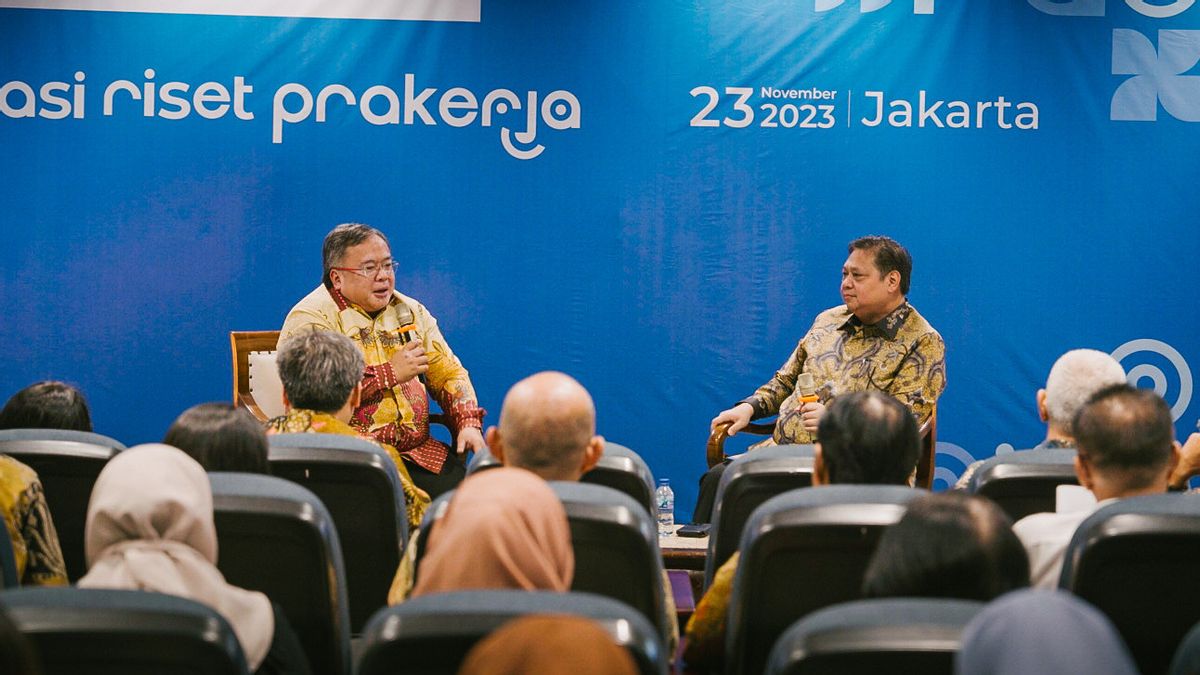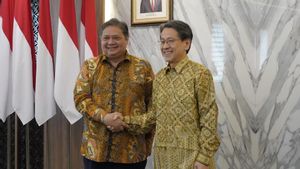Research results from three research institutions; DEFINIT, Center for Innovation Policy and Governance (CIPG), and Svara Institute show that the Pre-Employment Card Program provides positive benefits for its recipients. This usefulness finding does not only apply to the semi-social assistance scheme 2020-2022, but also to the 2023 Normal Scheme. The government plans to continue the Pre-Employment because it is considered to have a significant impact on the Indonesian workforce.
Coordinating Minister for Economic Affairs Airlangga Hartarto believes that the Pre-Employment program will continue in the next year even though the government changes. Especially because of the benefits and impacts that have been produced by Prakerja.
"The future budget is determined by the current government. So in the government's budget cycle, we can now entrust the sustainability program. If we propose superior programs including Pre-Employment in the 2025 State Budget, the program will continue," said Airlangga at the Pre-Employment Research Dissemination event Continuous Improvement, Environment-driven Decision Making organized by Pre-Employment and the Institute for Economic and Community Research at the Faculty of Economics and Business, University of Indonesia (LPEM FEB UI) at the MS UI Salemba Auditorium, Thursday, 23 November.
In a discussion developed by FEB UI Professor Bambang Brodjonegoro, Airlangga also believes that Pre-Employment can be a program that bridges workers and jobs, where the majority of jobs in the future will shift to the digital sector. Currently, Pre-Employment also provides digital training such as the Artificial Intelligence (AI) Talent Program in collaboration with Microsoft.
This is relevant to the job market challenges described by the LinkedIn platform and its Smart work portal at the event.
"Tten of the fifteen fastest-developed jobs in Indonesia are those that require digital expertise," saidaturcha Suresh, Head of Public Policy & Economics Graph, Southeast Asia LinkedIn.
Pre-Employment Executive Director, Denni Puspa Purbasari explained, since its launch in 2020, so far the benefits of Pre-Employment have been felt by 17.5 million people from 514 districts and cities in Indonesia.
Denni added that as a new program, Prakerja also always develops itself openly to research institutions to always provide an assessment and input on what is being done.
"We are often surveyed. That is important for continuous pre-employment improvement," he said.
ADB Indonesia Country Director Jiro Tominaga said his party was always committed to assisting the development of the Pre-Employment program by financing surveys conducted by independent institutions. This is in line with Pre-Employment which meets 8 of the 17 sustainable development goals (SDGs).
The founder of the DEFINIT research institute, Bagus Santoso, explained in his research results that 98.8 percent of respondents were very satisfied with participating in the training provided by the Pre-Employment program, both face-to-face and online.
"They also feel that the time period for purchasing the first training for 15 days is appropriate," said Bagus in his presentation.
The findings in the research conducted by the Asian Development Bank (ADB) also show that respondents feel that the training funds they receive are IDR 3.5 million and the incentives after the training of IDR 600 thousand are interesting. In his research conducted from 8-30 June 2023, Bagus used the adaptation methodology of Kirkpatrick's model with technical quantitative and qualitative analysis through word cloud, with a total of 2,972 respondents.
Meanwhile, in the findings of the CIPG research institute which was also supported by ADB, they explained that the existence of Pre-Employment launched during the COVID-19 pandemic was very beneficial in the process of national economic recovery. Deputy for Knowledge and Innovation CIPG, Mona L. Usmani explained her findings that economic conditions were more hit hard than health during the COVID-19 pandemic.
"87 percent of respondents are not too worried about getting COVID-19. So we see that when the economic impact crisis is more pronounced than their own health," Mona said.
Therefore, those registered in the Pre-Employment felt greatly helped by the program formed by the government at that time. In their research, CIPG took a sample of 385 respondents whose surveys were conducted from December 2022 to January 2023.
This research was also carried out using an interview method for deepening, where respondents were asked questions when they before and after received Pre-Employment with their economic conditions during the pandemic.
VOIR éGALEMENT:
Meanwhile, the third research put forward by the Svara Institute highlighted the availability and accessibility of the internet network in supporting pre-employment training held online during the COVID-19 pandemic.
"For Pre-Employment, we consistently still find positive and significant correlations, then when added to the BTS (Base Transceiver Station) it is also positive to improve competence, productivity, competitiveness and entrepreneurship skills," said senior SVARA Institute researcher Widdi Mugijayani.
The three results of research on Pre-Employment were also responded to by a number of panelists, namely the Dean of the Faculty of Economics and Business at the University of Indonesia, Teguh Dartanto; Head of IASEB FEB UI Turro Selrits Wongkaren; Head of the Population and Employment Economic Masters Study of FEB UI, Diahhadi Sethonaluri; and Senior Economist, Vivi Alatas. The majority of them appreciate the existence of Pre-Employment which can be a bridge to create a young generation to be able to have skills to work.
"This workforce prepares people who are ready to work in the job market and Pre-Employment encourages the marketplace which has been used more to sell goods. With Pre-Employment, this transformation of the marketplace for services on training," said Teguh Dartanto.
Meanwhile, Turro Selrits Wongkaren hopes that in the future Pre-Employment will not only be intended for workers at a young age but can also accommodate workers at an age before retirement so that they can continue to work.
"In the future, the number of elderly people will increase, but before going there, you have to go to old age, which means you are 40-50 years old, so if in the future this program wants to last, you must also see the needs of Indonesian workers who are a bit senior," he said.
The English, Chinese, Japanese, Arabic, and French versions are automatically generated by the AI. So there may still be inaccuracies in translating, please always see Indonesian as our main language. (system supported by DigitalSiber.id)













